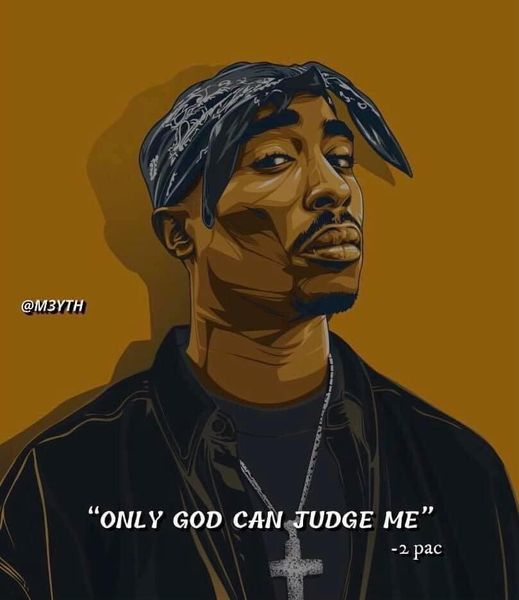The Legacy of Tupac Shakur
This image of Tupac Shakur appeared on my Facebook page recently, twenty-five years after his death in a drive-by ambush. His loyal fan-base keeps his memory alive, despite the discrediting of gansta-rap and the "Thug-Life" that Tupac exemplified, and in spite of changes in musical preferences and the emergence of younger talent. He even wore a "THUG LIFE" tattoo on his abdomen.
How does Tupac maintain such a hold on his fans;? He lived such a violent, checkered, hate-filled life—do his fans really listen to his songs? Do they really subscribe to that ghetto-ethos—the life of the urban jungle, survival of the toughest, and all that? Maybe, like Mark Twain's Huckleberry Finn, they don't want any part of the Whites' efforts to "sivilize" them. They need to remain tough and hardened in order to survive in their culture.
I will go out on a limb and say listeners also tap into the concerted, angry life-force that they detect in Tupac. He, in turn, lifts their lagging spirits. I also wonder if the Whites have any idea who the Blacks really are? Most whites only know what they see on the TV, and the succession of clown-faces that distract more than inform. The conflicts Blacks live with day-in, day-out, go unnoticed, except in the police blotter.
The biggest conflict of all remains the best-hidden--accepting the leadership of the Whites by default. They leave their future in the hands of the Whites, who do not know them—exactly as the Whites do not know them. It's a little like the blind leading the blind.
Social activists have criticized Tupac for his obscene lyrics celebrating the "Thug Life." It's all old hat, now that he's gone. His fans still love his courage in the face of betrayal by former friends, his bravery under fire, and the driving anger that colors his efforts. He repeats the basic message "Only God can judge me," and then adds, "All you other m__f__ers get out of my business."
The song tells the story of Tupac's shooting and hospitalization in 1994. It resonates among Blacks who share his grief and anger: "I couldn't trust my homies, just a bunch of dirty rats." He tells himself, "Try to remember, but it hurts." Much of the lyric of the song has a personal frame of reference that evades normal associations: "There's a ghetto up in heaven and it's ours. 'Black Power!' is what we scream, as we dream in a paranoid state, and our fate is a lifetime of hate."
Such lyrics score with lost, defeated people, who imagine their universe as a dystopian fantasy, like the Terminator or Star Wars movies. Black people sure won't advance in society if they cannot find a better context for their lives than Tupac. He drags listeners into his violence-imbued world-view. He and his listeners totally miss the larger reality of America as a technologically advanced society, with a consumer culture that beats any other on the planet. It offers the opportunity of advancement to anyone who gets an education and works hard.
Tupac appears blind to the benefits of a bourgeois society. The song continues, "No more hesitation. Each and every Black male's trapped, and they wonder why we suicidal runnin' 'round strapped." He may actually appeal to suicidal Black males toting firearms, but my guess is that the song succeeds best with middle-class suburban Black kids who are afraid of losing their manhood in the "sivilized" White world.
The lasting popularity of Tupac makes me believe that a large percentage of young Blacks do not feel optimistic about their lives. They have not developed personal qualities that empower them to make decisions for themselves and give them definition in the wider society. They cannot see the benefit of nationhood for themselves and the strength of a collective purpose. So they hold onto a beggar-status—basically shielding themselves from the larger issues in their lives.

